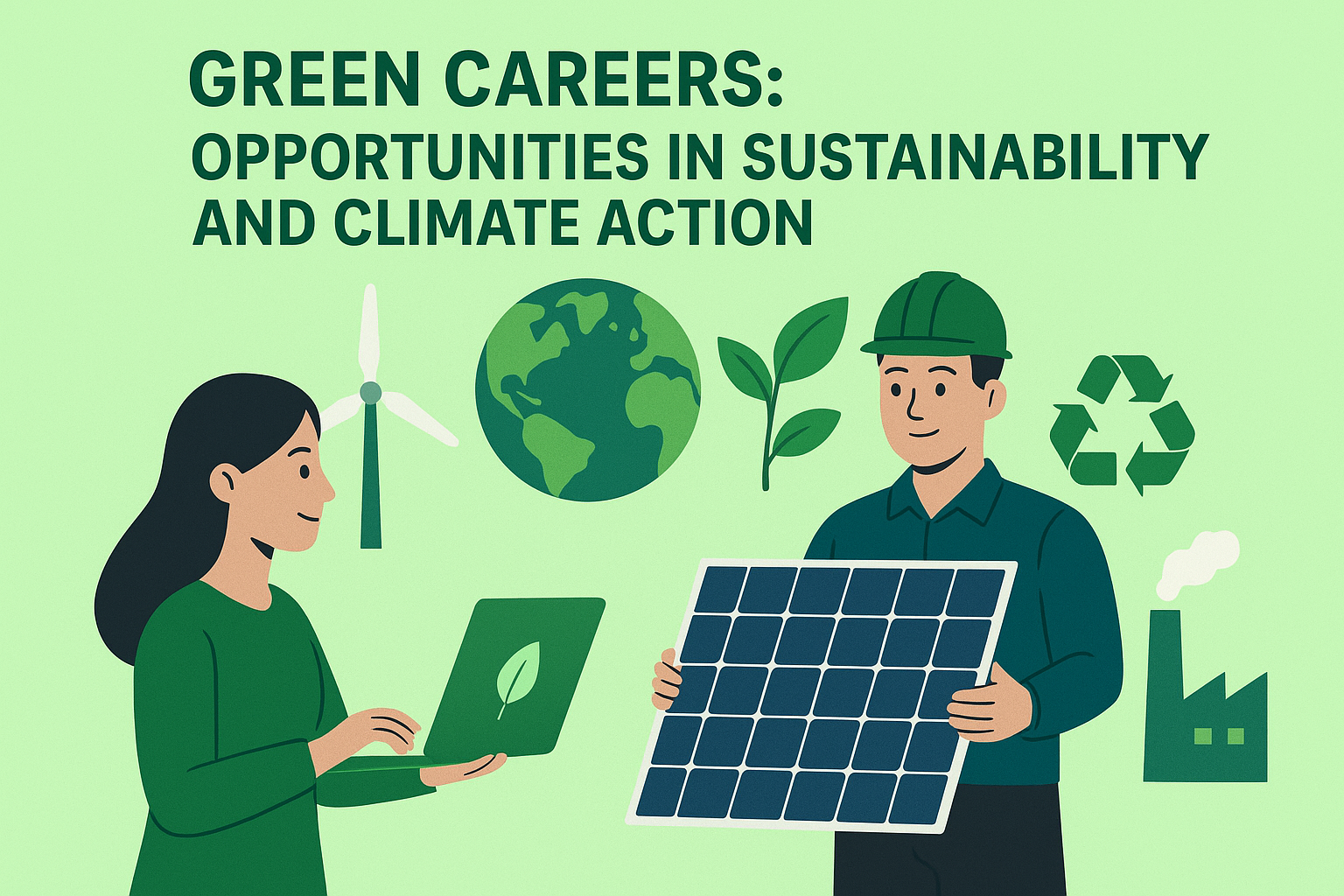**The world is going through a radical change in which sustainability is not an option but a requirement. Climate change, environmental degradation, and energy demands have changed the landscape of the world workforce and sustainability jobs are on the increase. Due to the efforts of many governments, corporations, and communities to undo their carbon footprints, a new field of sustainable career opportunities has opened. Solar energy employment or a career in environment sustainability are some of the professional fields where individuals with expertise in sustainability are highly needed.
This blog will look at the reasons this sustainability field is flourishing, the most successful ways to expand, and the means by which people can create meaningful work in the sustainability field.
1. Why Choose a Career in Sustainability?
The question, why the sustainability field has become a central issue to the job seekers today. Besides making a living, sustainability professionals contribute directly to the solution of climate change and the establishment of a green future. The reputation of organizations is currently determined not only by benefits, but also by environmental and social effects.
A sustainable career will provide individuals with the gratification of being a part of global development, and it will make them secure in a continuously expanding industry.
2. Global Growth of Sustainable Jobs
The International Labour Organization (ILO) forecasts that more than 18 million sustainability jobs will have been created by 2030. Governments are coming down more strongly on environmental policies and corporations are following suit making sustainability part of their brand. This creates opportunities in terms of employment in many areas like renewable energy and corporate social responsibility (CSR).
Workers with knowledge in the field of environmental science or renewable energy or climate policy, specifically, are in a good position to succeed in this emerging market.
3. Careers in Sustainability
Sustainability, environmental sciences, and other related degree-holders often wonder, “what can I do with my degree?” The solution is that there is a broad spectrum of jobs for sustainability majors in various sectors. These jobs do not stop in laboratories or NGOs, but spread into business, government, technology and even urban design.
The most demanded positions are:
Environmental Consultant: Assists companies to be environmentally friendly, including waste reduction, emissions management and regulation compliance.
Climate Policy Analyst: Can work in government, think tanks or NGOs to write and review policies addressing climate change and energy consumption.
Renewable Energy Specialist: Concentrates on renewable energy technologies such as wind, hydro and solar.
Urban Sustainability Planner: Develops sustainable urban solutions in areas such as green transportation, waste recycling and efficient land use.
Green Building Architect: Develops buildings which make maximum use of natural light, sustainable materials and the least amount of energy possible.
The benefit of sustainability major jobs is that they are a combination of innovation, being environmentally responsible, and applying it to the real world. Companies are in the process of hiring new talent with a contemporary sense of sustainability concepts. Graduates in this discipline are not only making careers but they are also becoming pillars in making this world more sustainable.
4. Jobs Involving Solar Energy
Solar power has been the most recent face of renewable energy sources, and has provided thousands of thrilling jobs involving solar energy. With the movement of nations away from fossil fuels towards clean energy, the solar power industry is at the frontline of the change with governments providing tax incentives and corporations investing in solar farms.
Few of the popular job opportunities are:
Solar PV Installer: These are the workers who can install and maintain the solar panels on homes and offices and large scale projects.
Solar Engineer: Solar engineers develop the solar systems and improve their efficiency; they are the ones who solve technical problems in terms of panel design and grid integration.
Project Manager: He/she is in charge of overseeing the construction and development of solar plants by ensuring goals are achieved within the deadline and budget.
Energy Auditor: Evaluates energy use patterns and suggests strategies of solar adoptions in order to save cost and emissions.
The peculiarity of solar jobs is that they have great growth potential. The International Energy Agency has reported that solar is the cheapest source of electricity in many parts of the world and this means that the need to get jobs related to solar energy will continue to increase. These are not only well-paying jobs but also help directly in achieving a clean energy future and cutting greenhouse emissions.
5. Environment Sustainability Careers
Careers in environment sustainability provide an individual with the opportunity to make a difference and save nature and ecosystems. They may include activities in engaging with local communities, governments, and NGOs to conserve biodiversity, manage and build resilience against climate change.
Career opportunities in this profession are:
Wildlife Conservationist: Helps to preserve the endangered species and natural habitats by working in the field, conducting research and advocacy.
Sustainability Coordinator: Implements environmental friendly programs in businesses, including recycling programs, water conservation and environmental supply chain.
Corporate Sustainability Officer: Oversees the environment in terms of the organizations adhering to environmental guidelines, tracking of carbon footprints and implementing sustainable policies.
Environmental Educator: Collaborates with schools, non-governmental organizations and communities to create awareness and promote sustainable activities.
There is a growing demand on careers in environment sustainability since climate change is having a direct effect on food security, water availability, and biodiversity. The practitioners in this field are the frontiers of humans coexistence with nature. Contrary to most other professions where the aim is strictly to make a profit, these careers offer great inner fulfillment and a feeling of achievement because they are able to make a physical impact on the well-being of the planet.
6. Corporate need of Sustainability professionals
Corporations have begun to employ sustainability managers to make sure that they are adhering to the laws and to satisfy consumer demands of green operations. Most enterprises need professionals that have the ability to gauge carbon footprints, implement waste management, and energy productivity.
This entails that a sustainable career in the corporate sector is rewarding not only due to the positive effect on the environment but also due to the high pay that such professionals attract.
7. Why the Sustainability Field is Resistant to the Recession
As much as other industries are likely to contract in economic downturns, the why sustainability field question shows that such is not the case with the sustainability field. Sustainability is linked to other worldly fundamental aspects such as food security, water conservation, and clean energy - aspects which will always be a priority.
This will sustain growth in sustainability jobs in various fields in the long run.
8. Skills Necessary
Work in sustainability is not just about enthusiasm. It is about a special combination of expertise, critical thinking, and management. Employers are interested in people who are able not only to comprehend environmental problems but also come up with practical solutions and implement them. Regardless of whether you are seeking sustainability major jobs or are entering the field with prior professional experience, the following are the salient competencies to develop:
Technical skills: These can be skills in renewable energy technology, environmental science, green building design or climate policy, depending on the job. As an example, a solar installer requires an understanding of engineering, whereas an urban planner might be interested in sustainable urban form.
Data Analysis & Research: Companies and NGOs need people who are able to gather, read and present information on carbon emissions, biodiversity and resource efficiency.
Project Management: Sustainability projects can have large project teams and huge budgets. Experience in planning, budgeting and coordination of activities are necessary.
Communication & Collaboration: Green initiatives have to be assisted by governments, businesses and societies. The ability to communicate complicated environmental matters in a simplified manner is important.
Solving Problems and Innovation: Whether it is minimizing wastage in production processes or developing energy-efficient mechanisms, professionals have to be innovative in their problem-solving approaches.
Certifications or training in sustainable energy, carbon auditing, or sustainable finance could also be useful to students preparing to work in the field of sustainability. These do not only serve to beef up resumes, but also signify devotion to employers.
Green careers are cross-disciplinary in the end. The combination of science, technology, business and communication skills provides you with the flexibility to work in any industry and make a significant contribution.
9. Future of Sustainability Jobs
The coming decade is going to see a green career growth that has never been experienced before. Climate change, growing energy needs, and global sustainability pledges are transforming the labour force and opening new horizons to professionals. In renewable energy, conservation and corporate approach, the need to have specialists in careers in environment sustainability will increase.
A number of the upstart jurisdictions have been characterized by massive growth prospects
Circular Economy Experts: Experts who model systems in which resources are reused and recycled and not wasted.
Green Finance Analysts: Analysts that invest and evaluate environmentally friendly businesses and renewable projects.
Carbon Trading Professionals: Specialize in management of carbon credits and emissions trading within international engagements.
Sustainable Supply Chain Managers: Individuals who will help in ensuring that products are produced, acquired and distributed in a manner which is less harmful to the environment.
The momentum towards a green career is both unethical and supported by world policies. The United Nations, governments around the world and the EU are implementing policies in order to achieve net-zero emissions. The companies are to comply, and this implies that they require skilled workers who are able to translate the regulations into action.
Moreover, the value systems are changing in society. The new young generation of workers wants to work in places that support their personal ideology. The fact that this is becoming increasingly a preferred career choice in environmental sustainability means that there will be more demand than supply, hence a very promising field in the 21st century.
In the future the sustainable career will no longer be a niche, but the common career in all industries. Sustainability will touch every sector of the professions, including engineering, finance, urban planning, education and others.
10. FAQs
1. What are sustainability jobs?
Sustainability jobs refer to positions that are geared towards minimizing environmental degradation and working towards environmentally friendly practices in fields like renewable energy, waste management, conservation and green finance.
2. Do sustainability majors work outside the environmental sphere?
Yes. Other careers available to sustainability majors are in corporate consulting, government policy-making, urban planning, and sustainable fashion.
3. Which are some of the solar energy jobs?
Careers in solar energy are solar PV technician, solar PV engineer and sustainability project manager on clean energy projects.
4. Why must I have a sustainable career?
A sustainable career is a long-term job with good salary and the opportunities of making a difference in the society and environment.
5. What are careers in environmental sustainability?
Environment sustainability careers are as a conservation scientist, environmental policy maker, wildlife biologist and corporate sustainability officer.
6. Why is the sustainability domain gaining momentum?
The reasons why sustainability is a field where questions arise are the increasing awareness of the world and its government, as well as corporate responsibility, which makes sustainability one of the most demanded fields.
7. Can sustainability jobs survive automation?
Yes. Sustainability employment needs human skills in environmental strategy planning, analysis, and implementation, so it can be less vulnerable to automation.
**

